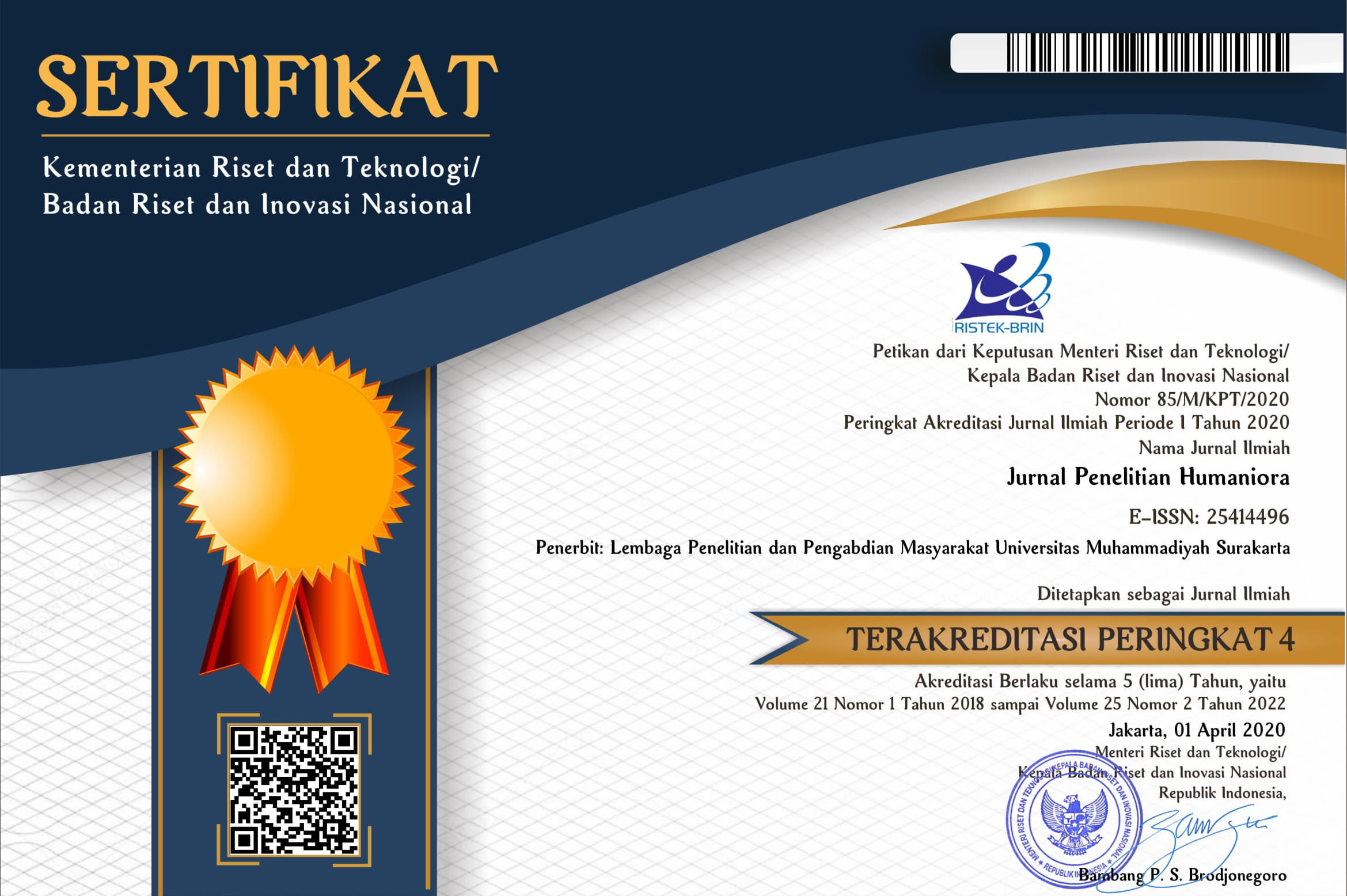THE REFUSAL STRATEGIES EMPLOYED BY PRE-SERVICE EFL TEACHERS: A COMPARISON BETWEEN JAVANESE AND SUMATRANS
Lintang Indah Ayu Respati Dewi(1), Lailatun Nurul Aniq(2*), Khairani Dian Anisa(3)(1) Universitas Sebelas Maret
(2) Universitas Sebelas Maret
(3) Universitas Sebelas Maret
(*) Corresponding Author
Abstract
Keywords
Full Text:
PDFReferences
Bardovi-Harlig, K. (2013). Developing L2 pragmatics. Language Learning, 63(1), 68-96.
Beebe, L., T. Takahashi, and R. Uliss-Weltz. (1990). Pragmatic transfer in ESL refusals. In R. Scarcella, E. S. Anderson, and S. Krashen (eds.), Developing Communicative Competence in Second Language. 55-73. New York: Newbury House.
Brown, P. and S. Levinson. (1987). Politeness: Some Universals in Language Use. Cambridge: Cambridge University Press.
Campillo, P. S., Safont-Jordà, M.F. & Codina-Espurz, V. (2009). Refusal strategies: a proposal from a sociopragmatic approach. Revista Electronica de Lingüistica Aplicada, 8, 139-150.
Codina-Espurz, V. (2013). The role of proficiency in the production of refusals in English in an instructed context. Utrecht Studies in Language and Communication, 25, 121-145.
Cohen, A. D. (1996). Speech acts. In S.L. Mackey and N.H. Hornberger (eds.), Sociolinguistics and Language Teaching. 383-420. Cambridge: Cambridge University Press.
Demirkol, T. (2016). How do We Say ‘No’ in English? Social and Behavioral Sciences, 232 ( 2016 ), 792 – 799.
Félix-Brasdefer, J. C. (2008). Perceptions of refusals to invitations: Exploring the minds of for-eign language learners. Language Awareness, 17(3), 195-211.
Fauziati, E. (2016). Applied linguistics:principles of foreign language teaching, learning, and researching. Surakarta: Era Pustaka Utama.
Gass, S. and N. Houck. (1999). Interlanguage refusals: a cross-cultural study of Japanese Eng-lish. New York: Mouton de Gruyter.
Golato, A. (2003). Studying compliment responses: A comparison of DCTs and naturally occur-ring talk. Applied Linguistics, 24(1), 90-121.
Kasper, G. (2000). Data collection in pragmatics research. In H. Spencery-Oatey (Ed.), Cultural-ly speaking: Managing rapport through talk across cultures, 316-341, New York: Con-tinuum.
Kasper, G. & Rose, K. R. (2001). Pragmatics in language teaching. New York: Cambridge University Press.
Kondo, S. (2008). Effects of pragmatic development through awareness-raising instruction: Re-fusals by Japanese EFL learners. In E. Alcón and A. Martínez-Flor (eds.), Investigating Pragmatics in Foreign Language Learning, Teaching and Testing. 153- 177. Clevedon: Multilingual Matters.
Patton, M. Q. (2001). Qualitative research and evaluation methods (3rd ed.). Beverly Hills, CA: Sage.
Wijayanto, A. (2019). Refusals in Javanese and English: A comparative study of saying ‘no’ in two different cultures. Journal of Intercultural Communication, 50(5), 1404-1634.
Article Metrics
Abstract view(s): 401 time(s)PDF: 352 time(s)
Refbacks
- There are currently no refbacks.











